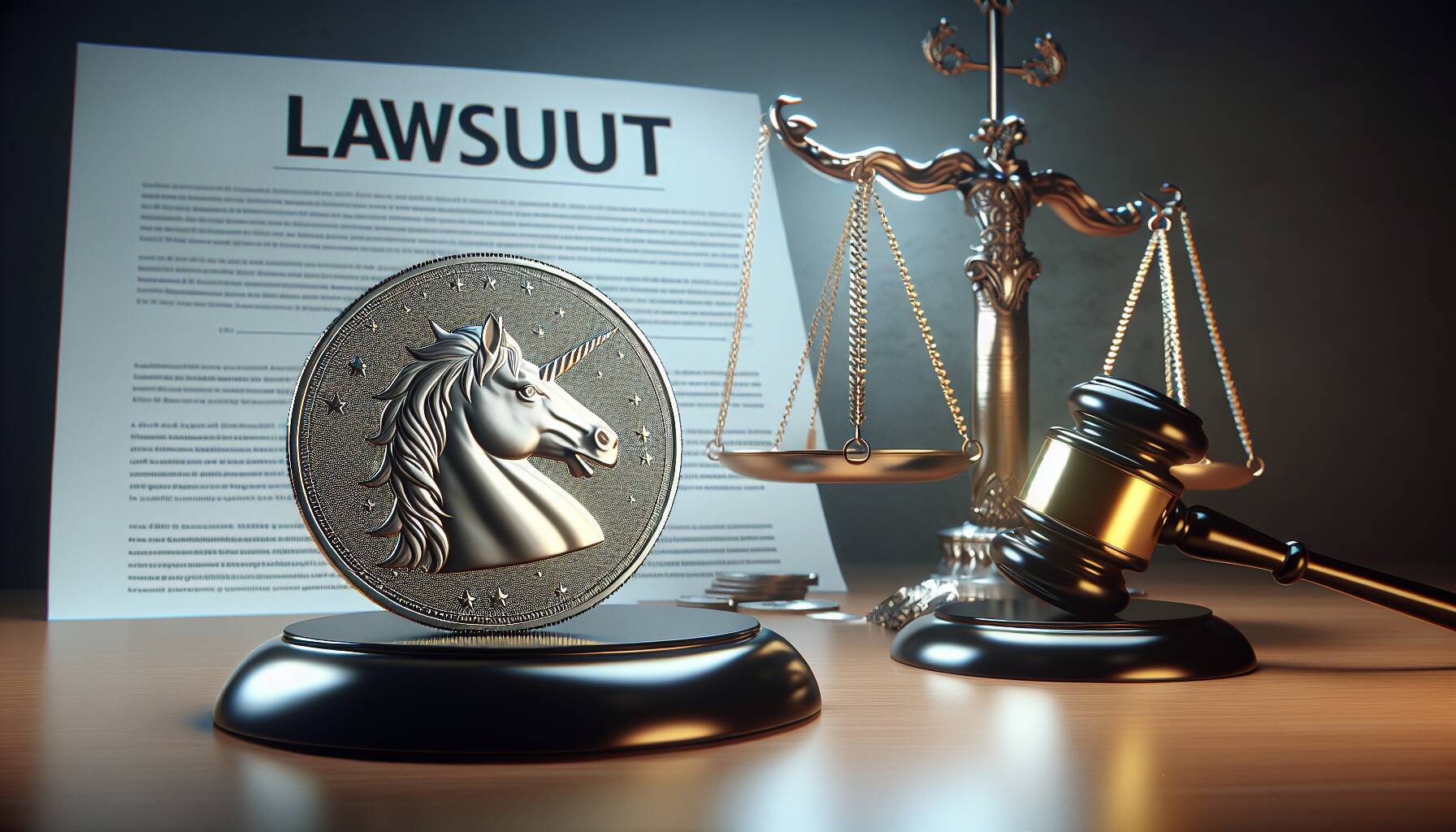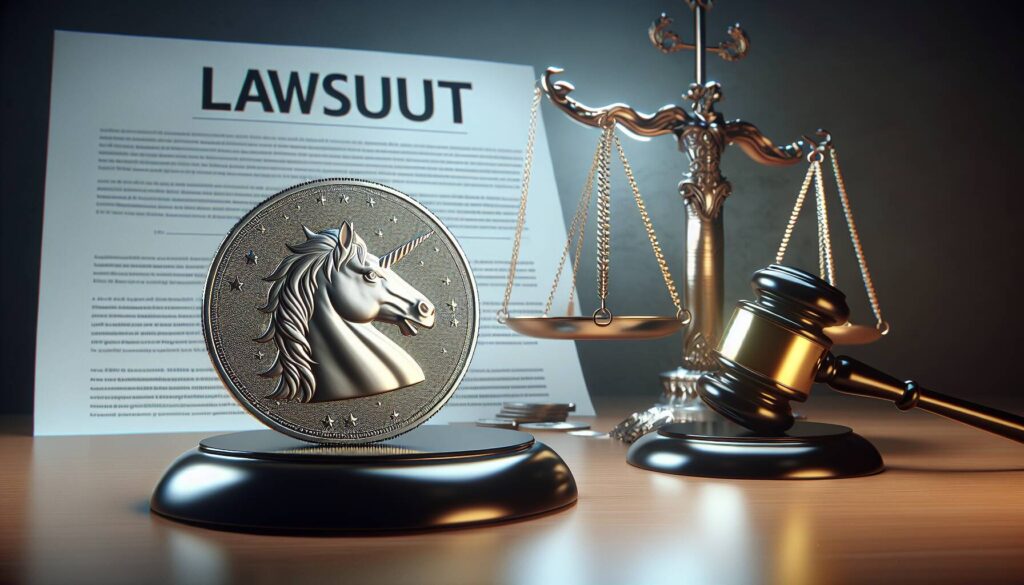The world of cryptocurrency witnessed a significant legal shake-up this week as the U.S. Securities and Exchange Commission (SEC) announced a lawsuit against Unicoin, a crypto company, and several of its executives. The SEC alleges that Unicoin raised over $100 million by marketing tokens linked to real estate investments that, in reality, the company did not own. This staggering claim highlights ongoing concerns about transparency and trust in the burgeoning crypto sector.
“The SEC’s lawsuit indicates that Unicoin’s executives misled investors by inflating the value of properties claimed to be acquired, with appraisals suggesting a total worth of more than $1.4 billion when, in fact, the true value was around $300 million,”
the complaint details. The legal proceedings target Unicoin’s CEO, Alexander Konanykhin, and three other key figures, accusing them of multiple securities law violations. According to the SEC, despite public claims of generating $3 billion in sales by mid-2024, Unicoin’s actual sales of its rights certificates did not exceed $110 million. The disparity between reported and actual figures raises serious questions about the company’s practices and credibility.
Moreover, the SEC highlighted some outrageous promises made by Unicoin in its marketing campaigns, including eye-popping return rates of up to 9 million percent. These claims were heavily publicized through various channels, from social media adorning taxi cabs to elaborate billboard advertising, drawing comparisons to the phenomenal rise of Bitcoin. Such marketing tactics, suggesting that early investors could replicate the fortunes of Bitcoin billionaires, have drawn intense scrutiny.
“We declined to show up,”
Konnanykhin stated in a recent interview, expressing his refusal to engage in perceived unfair pre-settlement negotiations with the SEC. Previously, Unicoin, which claims to be fully compliant with U.S. regulations, received a Wells notice from the SEC last December, marking the start of an intense regulatory investigation.
As the legal case unfolds, the SEC is seeking financial penalties and the restitution of allegedly misappropriated funds, shining a spotlight on the need for greater regulatory oversight in the cryptocurrency industry. Investors and industry observers alike are watching closely as developments continue to emerge from this high-profile lawsuit.

SEC Sues Unicoin and Executives for Fraud
The U.S. Securities and Exchange Commission (SEC) has initiated a fraud lawsuit against the cryptocurrency company Unicoin and its executives, which could impact investors, market perceptions, and the cryptocurrency landscape as a whole.
- Fraud Charges: The SEC has filed securities law violations against Unicoin and its executives for raising over $100 million through misleading claims.
- False Claims of Real Estate Ownership:
- The SEC alleges that Unicoin never owned the real estate properties it claimed to have acquired, which were said to have appraised values exceeding $1.4 billion.
- In reality, the combined actual value of these properties is reported to be around $300 million.
- Overstated Financial Performance:
- Unicoin claimed to have made $3 billion in sales but actually raised no more than $110 million, misrepresenting its financial stability to investors.
- Marketing campaigns promised returns of up to 9 million percent, leveraging Bitcoin’s historical growth to attract investors.
- Marketing and Promotions:
- Unicoin used aggressive marketing strategies including advertisements on various public platforms, aiming to create a perception of legitimacy and high returns.
- The company encouraged potential investors to ‘take advantage of the early days of Unicoin,’ misleading them about both investment risks and real returns.
- Ongoing Legal Battle:
- Unicoin’s CEO, Alexander Konanykhin, rejected the SEC’s attempts to settle the case, suggesting that the ongoing investigation has caused significant financial harm to the company.
- The SEC is pursuing financial penalties and recovery of profits gained through alleged fraudulent activities.
“Unicoin, the only fully U.S.-registered, U.S.-regulated, U.S.-audited, and U.S.-publicly reporting cryptocurrency company, has consistently complied with all regulations.” – Unicoin spokeperson
This case highlights ongoing challenges within the cryptocurrency market, particularly concerning transparency and regulation. For investors, staying informed about legal matters can help identify safe investment opportunities and avoid potential fraud. Furthermore, developments in this case could influence regulatory efforts nationwide, ultimately shaping the future of cryptocurrency investments.
SEC vs. Unicoin: A Deep Dive into the Fallout of Fraud Allegations
The recent lawsuit filed by the U.S. Securities and Exchange Commission (SEC) against Unicoin and its executives has thrown the spotlight on the challenges facing the cryptocurrency industry. As similar cases have emerged in the sector, a comparative analysis reveals both competitive advantages and disadvantages that could impact players in this rapidly evolving space.
On one hand, the SEC’s decisive action against Unicoin signals a tough stance on regulatory compliance, possibly instilling greater investor confidence in legitimate crypto ventures. Companies that maintain transparency and adhere closely to regulations may find themselves gaining credibility amidst an atmosphere of skepticism. This dynamic could favor industry players that prioritize compliance, potentially attracting risk-averse investors seeking reliable projects.
However, the allegations against Unicoin also highlight significant risks associated with misleading marketing practices in the cryptocurrency space. Unicoin reportedly overstated both its asset acquisitions and the returns it promised to investors. Consequently, this revelation could generate a wave of distrust among potential investors across the industry. Companies that engage in over-promising and under-delivering could face harsh scrutiny not just from the SEC but also from wary consumers, complicating their growth strategies.
A critical concern emerging from this situation pertains to the broader implications for startups in the cryptocurrency market. Many emerging players look to capitalize on the explosive growth potential of crypto investments, but the Unicoin case serves as a cautionary tale. Companies may need to invest significantly in compliance and legal assurances to avoid becoming targets of similar legal actions, potentially straining their resources at a critical growth stage.
Additionally, seasoned investors may begin to recalibrate their expectations regarding investment returns in the crypto sector. With examples like Unicoin highlighting deceptive practices, a shift towards fundamental analysis rather than hype-driven investments could solidify in the market. This could benefit platforms focused on genuine value creation and sustainable growth, while leaving others that rely on speculative growth models vulnerable to investor backlash.
Thus, while the fallout from the Unicoin lawsuit may provide an opening for compliant companies to differentiate themselves, it may simultaneously pose existential challenges for those that employ questionable practices. Stakeholders must navigate these turbulent waters thoughtfully, as the consequences can reverberate across the entire crypto ecosystem.

















